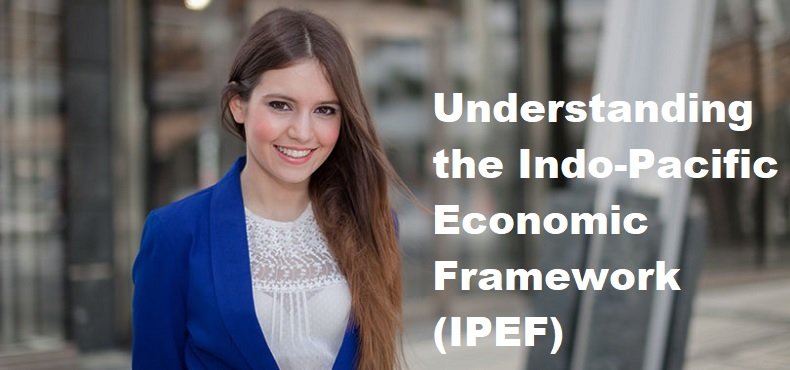The Indo-Pacific Economic Framework (IPEF) is a concept initiated to encourage inclusive, sustainable and rule-based economic cooperation and development in the Indo-Pacific region. IPEF creates a foundation for countries in the region to support each other in realizing stability, security and shared prosperity. Through the IPEF framework, various countries can identify opportunities and overcome challenges by synergizing in the infrastructure, energy, digital, trade and investment sectors. The basic concept of IPEF is based on an open, transparent and accountable system in which international norms and laws are enforced fairly. It aims to create a conducive environment for inclusive economic growth and sustainable development throughout the Indo-Pacific region. IPEF discusses strategic issues ranging from better connectivity between member countries to collaboration in the fields of innovation and technology.
The background to the formation of IPEF was a response to the need for a more cooperative and coherent regional economic order in facing various global challenges, such as climate change, income inequality and geopolitical competition. IPEF helps address the shortcomings of economic integration across the Indo-Pacific region and ensures that member countries have fair and equitable access to take advantage of existing economic opportunities. The main goal of IPEF is to realize effective, fair and mutually beneficial cooperation between member countries in the Indo-Pacific region. In achieving this goal, IPEF provides a platform for member countries to exchange information, share best practices, and increase capacity in facing challenges and utilizing resources optimally. Apart from that, IPEF also creates opportunities for participating countries to improve infrastructure connectivity, develop the renewable energy sector, expand digital technology penetration, and strengthen trade and investment relations. In this way, IPEF creates an ecosystem that encourages inclusive and sustainable economic growth in the Indo-Pacific region, while strengthening ties between member countries in facing common challenges.
IPEF Principles
The main principle of IPEF is to encourage inclusive and sustainable economic cooperation. This initiative focuses on creating opportunities and jobs that are environmentally friendly and can improve the overall welfare of society. Apart from that, IPEF also prioritizes fair and free trade, as well as inclusive investment in order to create equitable economic growth for all members.
The second IPEF principle is transparency, legal regulations and employer discretion. This principle emphasizes the importance of good and efficient governance in creating a conducive business environment. In practice, this involves the application of international standards, openness of information, as well as public accountability and participation in the policy-making process. Apart from that, support for entrepreneurs and enforcement of legal regulations as a basis for carrying out business is one of the main issues in maintaining regular economic growth.
Security and resilience of the digital economy is the third principle in IPEF. In the current era of information technology, data and information security is very important to maintain economic stability and trade between countries. Therefore, IPEF encourages strengthening cooperation in the field of cyber security as well as exchanging technology and innovation in order to create a safe and resilient digital economic system. This will ensure data integrity and individual privacy as well as protect intellectual property and national critical infrastructure from the threat of attack.
Opportunities and benefits of IPEF for member countries
The opportunities and benefits of the Indo-Pacific Economic Framework (IPEF) for member countries are very diverse and promise many benefits. One of them is increasing trade, investment and regional economic integration. Within the IPEF framework, member countries can expand market access, reduce trade barriers, and create a conducive environment for investment. Increasing trade and investment will encourage economic growth in the Indo-Pacific region, create jobs and improve people’s welfare. Apart from that, IPEF also promotes quality infrastructure development. Infrastructure development is a top priority for many countries in the Indo-Pacific region as an important factor in increasing connectivity and economic competitiveness. Through cooperation in IPEF, member countries can collaborate on strategic infrastructure projects, whether in the fields of transportation, energy or telecommunications. This collaboration will not only provide direct economic benefits but will also bring long-term benefits in the form of increased connectivity between member countries.
Supporting digital economy initiatives for inclusive growth is one of the important points in IPEF. The growth of the digital economy industry is a catalyst for accelerating economic transformation and encouraging innovation in the Indo-Pacific region. Through IPEF, member countries can share experiences, develop policies that support the digital economic industry, and increase human resource capacity to face the digital era. That way, member countries can work together to create an inclusive and equitable digital economic ecosystem. Overall, the Indo-Pacific Economic Framework (IPEF) has significant opportunities and benefits for member countries. From increasing trade and investment, building quality infrastructure, to supporting digital economy initiatives for inclusive growth. Through strong cooperation between member countries, IPEF can accelerate the process of integration and economic growth in the Indo-Pacific region. Effective implementation of IPEF will increase the economic resilience of member countries and create inclusive, sustainable and balanced development for all parties involved. Therefore, member countries need to work together and support each other to optimize the benefits of the various initiatives offered by IPEF.
Challenges and future developments in IPEF
The first challenge in developing the Indo-Pacific Economic Framework (IPEF) is to address the imbalance in economic contributions and benefits between members. This imbalance can give rise to divisions and dissatisfaction among member countries, thus hindering the achievement of common goals. Therefore, it is important for IPEF to ensure a fair distribution of economic contributions and benefits, through the development of policies and mechanisms that can balance the interests of all parties involved.
Facing global competition, especially with China’s development strategy in the Asia Pacific, is another major challenge for IPEF. The success of IPEF depends on the extent to which this framework is able to create favorable conditions for member countries to compete globally and increase their economic resilience. This includes promoting foreign investment, modernizing infrastructure, developing human resources, and strengthening trade relations between member countries.
One important aspect that must be integrated in IPEF is the environmental sector. So far, economic growth has often been accompanied by increased exploitation of natural resources and environmental pollution. For this reason, IPEF needs to align economic interests with environmental sustainability, through implementing environmentally friendly practices in various economic sectors and enforcing strict regulations to protect natural resources and ecosystems in the Indo-Pacific region.
In facing these challenges, IPEF must optimally explore the potential for regional collaboration. Through solid cooperation between member countries, IPEF can create synergies that will strengthen their position on the global economic stage. Developing joint strategies in resource utilization, increasing industrial added value, and technological innovation can be a long-term solution in overcoming economic imbalances and increasing global competitiveness. In this way, the Indo-Pacific Economic Framework will be able to achieve its main goal of creating inclusive, sustainable and competitive economic growth for all member countries in the Indo-Pacific region. In addition, close cooperation in the environmental sector will help ensure that this economic growth does not come at the expense of environmental prosperity and ecosystem sustainability in the future.








